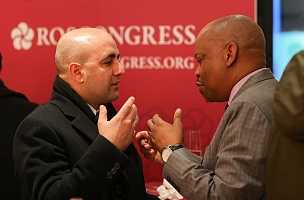KEY CONCLUSIONS
Digital transformation — a thorough revolution in the development of the Russian economy and society
«Mobility has changed dramatically. More than 57% of the people in the country already have a mobile device. More than 40% of traffic is generated by mobile devices, not by desktops [...] This means growth in computing power and certainly tremendous taste and interest among people of all ages and social groups», Russian Deputy Prime Minister Maxim Akimov said.
«We have a unique chance to make the country one of the leaders not only in terms of digitalization, but in terms of people’s quality of life fr om the perspective of their interaction with the state and the preservation of the life, health, and the time of our dear fellow citizens», Sberbank CEO and Chairman of the Executive Board Herman Gref said.
«Data has turned into an asset. Today, data is the gold and oil of the 21st century, and whoever learns to work with it faster, process it, cluster it, and make the relevant products fr om it that creates added value will be out in front in this regard», Federal Tax Service Head Mikhail Mishustin said.
«The digital region is not simply a digital government and a digital state. We must also help our industries to digitize themselves because it’s a matter of our competitiveness», Novgorod Region Governor Andrey Nikitin said.
Digitalization improves decision making and service delivery speed
«Informatization is an attempt to automate routine activities using computers and convert them into electronic form. Digitalization is decision-making based on data. This is a fundamentally different paradigm, a fundamentally different experience, and removing the individual fr om making simple decisions reduces the subjectivity of decision-making and increases the speed of decision-making», Gref said.
«Digitalization occurs wh ere and when data changes people’s behaviour, their preferences, their choices, their sense of self, and their degree of comfort, and doesn’t just improve certain procedures [...] Digitalization is when I get something new that is good: educational content or the ability to book a hotel within seconds», Akimov said.
«Digitalization is about no one noticing automation. It should be easy and convenient. I very much hope that the proactive systems we are working with today will help our taxpayers to not notice the tax service in our lives», Mishustin said.
Digital technology helps create high-quality social infrastructure
«Modern electronic content can be delivered to any destination. Today, we can establish a system of remote medical care [...] Infrastructure development and the promotion of high-speed Internet in the regions is one of the most important political and social tasks as opposed to a technical one», Rostelecom President and Chairman of the Management Board Mikhail Oseevskiy said.
«Three quarters of households must be connected to broadband access as part of the implementation of the Digital Economy programme per the President’s decree. We now have the resources that need to be properly utilized for this, the funds, and, most importantly, the technical solutions and reliable partners. We have launched this work today via wireless access in four regions. This year an experiment will be held with LTE450. The first bidding will be held in 11 regions by 31 March. We are building a competitive model and purchasing connection services for 5 years on a tender basis», Akimov said.
The regions are actively developing modern digital services
«In terms of the quantity and quality of smart city and digitalization services, Moscow ranks first in the world. We can be proud that this is possible and is being done in Russia. The tax service is a leader among OECD member countries in terms of the promotion and introduction of digital services», Gref said.
«Investment in information and communication technologies amounted to roughly RUB 1 billion over the past year, and about half of these funds have gone towards software and various solutions», Kaliningrad Region Governor Anton Alikhanov said.
PROBLEMS
Insufficient development of a digital culture
«We have not paid sufficient attention to the education of the elderly and we need to focus on this. It’s not enough just to create a Wi-Fi zone in a village and bring the Internet there — we need to teach people how to use this service. The government, regional authorities, and business will need to focus on this in order for the digital culture to really grow», Oseevskiy said.
Lack of a common platform for digital services
«Moscow is definitely ready to share this experience [...] We invite all interested parties to unite around creating a kind of platform [...] that would make it possible to receive the necessary services or solutions in a manner that is comfortable for the regions [...] We need a new framework that unites around this and political authorities with these declarations and organizational and financial resources, including Sberbank, I think», Minister of the Government of Moscow, Head of the Department of Information Technologies of Moscow Eduard Lysenko said.
SOLUTIONS
Building multiservice digital infrastructure
«Digitalization means comfort and convenience for residents [...] It means speed and an opportunity to get the most out of a single point, or getting the services from the mayor’s portal that they used to have to come in person for in their regular lives, talk with certain minor officials, etc. Second, for us digitalization is the transparency of management and funding. And third, digitalization is a new feature of the usual things», Lysenko said.
«In 2–3 years, we can definitely get to the point that people do not have to come to government agencies and resolve all the issues that they expect from the state in electronic form. In terms of taxes, we have formalized all work processes [...] After this, the most interesting thing is reengineering, how to do things better, and how to spend less. We have built a system wh ere we have separated all routine processes from the processes that are necessary for decision-making», Mishustin said.
«It is essential to shift from a policy of purchasing products and services to a service model wh ere you get them as services. That’s why today we are offering this specific model to business and, incidentally, the government — the public side. There is no need to build your own data centres and no need to purchase computers. Rostelecom is now ready to be flexible in order to solve the problem of digitalization today with payment within a certain period. I am confident that 2019 will be the year when Rostelecom and Sberbank have new collaboration, including as regards services», Oseevskiy said.
Improving the availability and quality of services
«I think that we will have a truly normal and proper digital breakthrough in informatization, and then the creators will already have a higher digital culture, and the services themselves will be better», Lysenko said.
«Today, there are flexible opportunities in other sectors, in housing and public utilities, and in healthcare, and I think both the regional authorities and federal authorities need to more actively look for these PPP and concession opportunities. The form isn’t even important here. The content is what’s important», Oseevskiy said.
«Approaches based on customer focus, data centering, modern environments and approaches for the development of applications, and interaction with business services on a non-discriminatory basis are all very important things», Akimov said.






